Gardeners Notting Hill: A Flourishing Community of Green Thumbs
Introduction to Notting Hill's Vibrant Gardening Scene
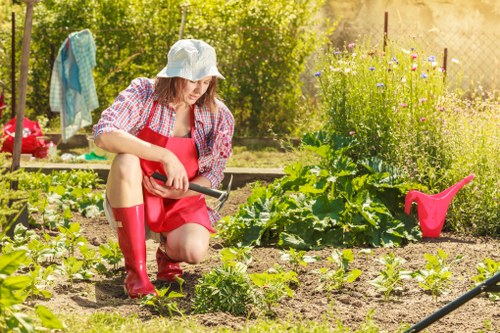
Notting Hill is famed for its colorful streets, eclectic culture, and welcoming community. At the heart of this vibrant area lies a passionate group of gardeners whose efforts transform humble outdoor spaces into breathtaking gardens. These dedicated horticulturists not only beautify the neighborhood but also provide solace and a sense of community to its residents. As you wander through the charming lanes, you might notice small urban oases, hidden behind doorways or nestled in apartments, where lush greenery takes center stage. The work of Notting Hill gardeners is a living testimony to creativity and resilience. Their innovative techniques, sustainable practices, and love for nature have sparked a revival in urban gardening. As a result, the area is transformed into a peaceful retreat that blends history, art, and nature into one harmonious community.
In the heart of the city, where tall buildings stand as a reminder of modernity, there exists a secret world driven by deep-rooted passion for nature. Gardeners in Notting Hill understand the value of cultivating both the land and community. Their gardens often serve as educational hubs, where workshops and shared events bring residents together. With organic methods and careful planning, these enthusiasts manage to grow vibrant flowers, aromatic herbs, and healthy vegetables. The community’s unified efforts promote sustainability and inspire others to embrace eco-friendly lifestyles. This transformation is not just aesthetic; it is emblematic of hope, unity, and the opportunity for a greener future. Here, every plant tells a story of community, care, and environmental mindfulness.
Beyond the beauty, urban gardening in Notting Hill is an act of empathy—a way to reconnect with nature in an increasingly digital world. Local gardeners blend traditional practices with modern techniques to overcome limited space and urban challenges. They experiment with vertical gardens, container planting, and innovative soil regeneration methods to maximize small spaces. This dynamic balance of tradition and innovation echoes the neighborhood’s historical evolution and diverse culture. As community gardens become gathering spots, they foster mutual respect, education, and shared responsibility for the urban environment. The collective work of these gardeners spurs community engagement, making green spaces accessible to everyone, regardless of background or age.
A Brief History and Evolution of Gardening in Notting Hill
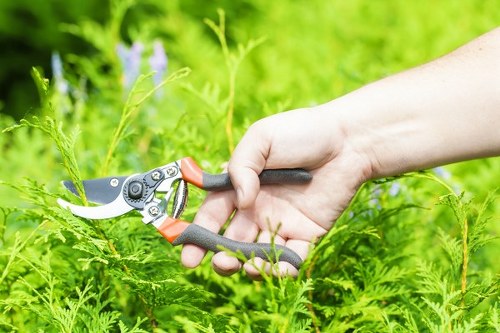
The gardening tradition in Notting Hill is steeped in history and has evolved over decades. Originally, the region was known for its expansive fields and market gardens that supplied fresh produce to neighboring areas. Over time, with urban development, many of these spaces disappeared, only to be reborn through community efforts. The revival of gardening in this area began as a grassroots movement, where residents took ownership of derelict plots and transformed them into beautiful green spaces. By using organic techniques and recycling urban waste, they created environments that nurtured both flora and fauna. This blend of historical groundwork and modern innovation is a testament to the unyielding spirit of Notting Hill’s residents.
As the decades progressed, the transformation of Notting Hill became more profound. Many community gardens emerged where once there were abandoned lots and unused rooftops. Elder gardeners shared their long-forgotten techniques, while younger enthusiasts experimented with newer, sustainable methods. The area’s dynamic evolution is reflected in its diversity: from classic English rose gardens to vibrant vegetable patches, Notting Hill now boasts a colorful array of horticultural designs. This progressive approach has helped the local community reclaim spaces for nature, allowing gardening to become both an art form and an essential part of urban life.
The historical evolution of gardening here is intertwined with the changes in the broader social fabric. After periods of industrial decline, local initiatives brought communities together to re-green their surroundings. Residents realized that a little care for nature could yield enormous benefits in quality of life. The integration of eco-friendly practices, such as composting and rainwater harvesting, mirrored the global push for sustainable living. Notting Hill gardeners have created a legacy that bridges the past with the future—honoring time-tested gardening practices while embracing innovative techniques that make urban horticulture accessible to all.
Innovative Gardening Techniques and Sustainable Practices
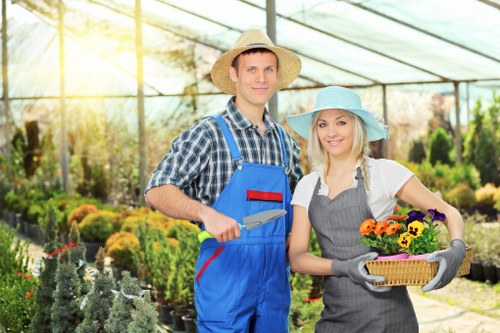
Modern gardeners in Notting Hill have embraced a variety of innovative techniques that combine sustainability with creativity. One notable trend is the use of container gardening to maximize space in narrow urban backyards and rooftops. These small-scale gardens not only brighten up the concrete landscape but also improve air quality and reduce the urban heat island effect. Gardeners are increasingly turning to practices that conserve water and reuse resources, such as drip irrigation systems, rainwater collection, and composting biodegradable waste. Such initiatives illustrate the community’s commitment to a more sustainable urban lifestyle and encourage residents to participate actively in green practices.
Another ingenious approach is vertical gardening. By growing plants on walls and fences, Notting Hill’s gardeners have found a way to beautify structures that were once considered mere functional elements. This technique not only saves space but also creates living walls that provide natural insulation. Additionally, customized trellis systems for climbing plants and vines add a distinct, artistic element to the urban setting. Gardeners Notting Hill have been eager to experiment with seasonal blooms, drought-resistant species, and native plants that require minimal maintenance. Their commitment to efficiency and environmental stewardship stands as a model for urban gardening communities globally.
Alongside these innovative methods, there is a growing emphasis on organic gardening practices. Local gardeners avoid synthetic chemicals and pesticides, opting for natural fertilizers like compost and organic mulch. Community workshops and local seminars often focus on the benefits of natural pest control and seasonal planting patterns. By sharing knowledge on crop rotation and soil enrichment, these gardeners not only enhance the beauty of their surroundings but actively contribute to a healthier ecosystem. Their efforts reflect a deep-seated belief that nurturing nature requires both thoughtfulness and a commitment to sustainable practices. Each garden is a small laboratory where modern techniques merge harmoniously with the timeless rhythms of nature.
Community Engagement and the Role of Local Gardeners
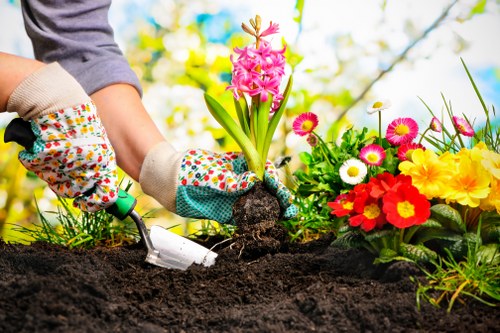
Notting Hill’s gardening community is built on a foundation of collaboration and shared passion. Local initiatives often see volunteer days where neighbors come together to clear unwanted vegetation, plant new seeds, and repair communal spaces. These events serve a dual purpose: they not only produce beautiful gardens, but also foster social bonds among the local residents. Gardeners, ranging from seasoned horticulturists to novice enthusiasts, collaborate and share tips, transforming each meeting into a vibrant learning and cultural exchange session. Through their collective work, community gardens become symbols of hope and resilience amidst urban challenges.
Workshops and community programs are frequently organized to educate and inspire both young and elderly residents about the joys of gardening. Topics such as organic pest control, innovative landscaping, and water conservation are covered in detail. These sessions serve as a platform for sharing both traditional techniques and contemporary methods. The role of local gardeners in Notting Hill goes beyond beautification; they are instrumental in cultivating a sense of ownership and responsibility for the local environment. In doing so, they create safe, welcoming spaces where creativity and nature co-exist harmoniously. Community-driven gardening projects also highlight the importance of green spaces in urban mental health, offering residents a peaceful retreat from the daily hustle.
In addition to educational programs, many gardeners have initiated social clubs that meet regularly for garden tours and plant exchanges. Such clubs have introduced innovative ideas that blend art with horticulture—ranging from mosaic stepping stones to handmade planters. In one inspiring instance, a group of local gardeners collaborated with a local artist to create a mural that celebrated nature and community spirit. This melding of artistic expression with practical gardening further emphasizes the role of Notting Hill gardeners in transforming ordinary spaces into canvases for environmental art. Their relentless efforts serve as a beacon, encouraging everyone to find joy in nurturing nature and connecting with the local community.
Notting Hill and Its Surrounding Areas: A Green Network
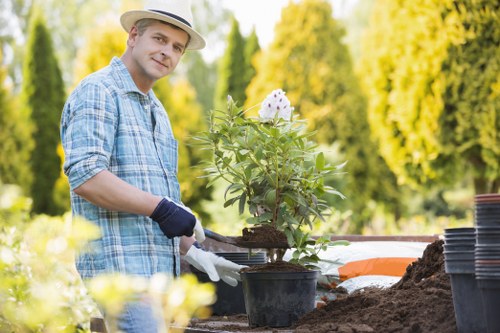
Notting Hill has long been regarded as a hub for creative expression and community spirit. Yet, its appeal extends even further—into the nearby areas that also boast rich gardening traditions and green spaces. When you look around Notting Hill, you discover various neighborhoods that are equally devoted to enhancing their living environments. These adjacent areas include Kensington, Chelsea, Bayswater, Holland Park, Ladbroke Grove, Westbourne, Paddington, Marylebone, Fulham, Camden, Soho, and Covent Garden. Each area has its own unique charm and set of gardening specialties, making the whole region a patchwork of green innovation and community collaboration. The proximity of these neighborhoods allows for easy sharing of ideas, resources, and even gardening produce, fostering a regional network of eco-friendly practices.
For instance, Kensington is known for its elegant garden squares and meticulously maintained private gardens, which often serve as a source of inspiration for community projects in Notting Hill. Similarly, Chelsea stands out with its boutique horticultural shops and specialized garden centers that offer rare plants and eco-friendly gardening tools. Meanwhile, Bayswater and Holland Park contribute expansive green spaces that are perfect for community gatherings and open-air workshops. This rich diversity in gardening approaches among neighboring areas underlines the crucial role local gardeners play in uplifting urban environments.
Moreover, the close-knit relationship among these neighborhoods is reflected in various collaborative festivals and green fairs. Throughout the year, residents from these areas participate in events that celebrate gardening acumen and sustainable living practices. Local markets brim with hand-grown vegetables, sourced from communal gardens that emphasize organic cultivation. By establishing a vibrant network, these areas also support each other during seasonal challenges, sharing resources like tools, seeds, and expert advice. This interconnected approach propels the entire region toward a greener future, symbolizing not just a commitment to beauty, but a responsible stewardship of nature in an urban setting.
Additional Tips for Aspiring Gardeners in Notting Hill
For those who are new to the world of urban gardening, Notting Hill offers a plethora of opportunities to learn and grow. It is beneficial to start with small projects, such as creating a windowsill herb garden or a container vegetable patch. Local community centers often provide workshops that cover the basics of soil management, seasonal planting, and water conservation. Using simple and accessible techniques can ease beginners into the art of gardening while also contributing to environmental sustainability. Patience and persistence are key, as every seed planted is a step toward a more vibrant, greener environment.
Aspiring gardeners should also consider joining local gardening clubs or online forums. These platforms are a great resource for exchanging tips, troubleshooting common problems, and even sharing stories of success and failure. In addition, many established gardeners in Notting Hill are more than willing to offer guidance and share their expertise. By building networks within the community, beginners gain not only practical knowledge but also the companionship of like-minded individuals who share a passion for nature. Participating in community gardening projects is a practical way to learn and contribute at the same time.
Embracing sustainable practices, such as composting kitchen scraps and using natural pest deterrents, can also make a significant difference. With clear instructions available from community centers and local experts, even those with no prior experience can learn the ropes. Beginning with a few simple steps can lead to a rewarding journey of self-sufficiency and creative expression. After all, gardening is much more than cultivating plants—it is about cultivating life, transforming urban spaces, and nurturing a community that thrives on shared responsibilities and mutual respect.
Frequently Asked Questions
- What makes gardening in Notting Hill unique?
Gardeners in Notting Hill blend history, culture, and sustainability into their practices, creating small urban oases that reflect the neighborhood’s vibrant diversity. - How can I start my own garden in a small space?
Begin with container or vertical gardening, and consider joining local workshops to learn practical techniques. - What eco-friendly practices do local gardeners use?
They focus on organic fertilizing, water conservation, composting kitchen waste, and reusing materials for sustainable growth. - Are there community events for gardeners in the area?
Yes, Notting Hill frequently hosts gardening workshops, plant exchanges, and community fairs that encourage participation across neighborhoods. - How do neighboring areas contribute to Notting Hill’s green network?
Surrounding areas like Kensington, Chelsea, and Holland Park collaborate by sharing resources, ideas, and participating in regional gardening festivals.
Conclusion: Cultivating a Greener Future Together
The story of Gardeners Notting Hill is one of passion, resilience, and communal spirit. Over the years, residents have transformed barren urban spots into blossoming gardens that serve as havens of creativity and nature. Through innovative techniques, sustainable practices, and a deep sense of community, the gardeners of Notting Hill are not only beautifying their surroundings but also crafting a legacy that will inspire future generations.
Whether you are an experienced horticulturist or just starting, the welcoming community of Notting Hill offers valuable lessons in patience, innovation, and environmental stewardship. Here, every seed planted and every flower nurtured is a tribute to the enduring power of nature and the human spirit. Embrace the journey of gardening—a journey of rediscovery, healing, and shared dreams.
As urban landscapes continue to evolve, the role of local gardeners becomes increasingly vital in fostering a sense of belonging and purpose. Their work underscores the importance of creating spaces where nature flourishes and communities thrive. By tackling environmental challenges head-on and embracing eco-friendly solutions, Gardeners Notting Hill continue to pave the way for a greener, healthier future for all.